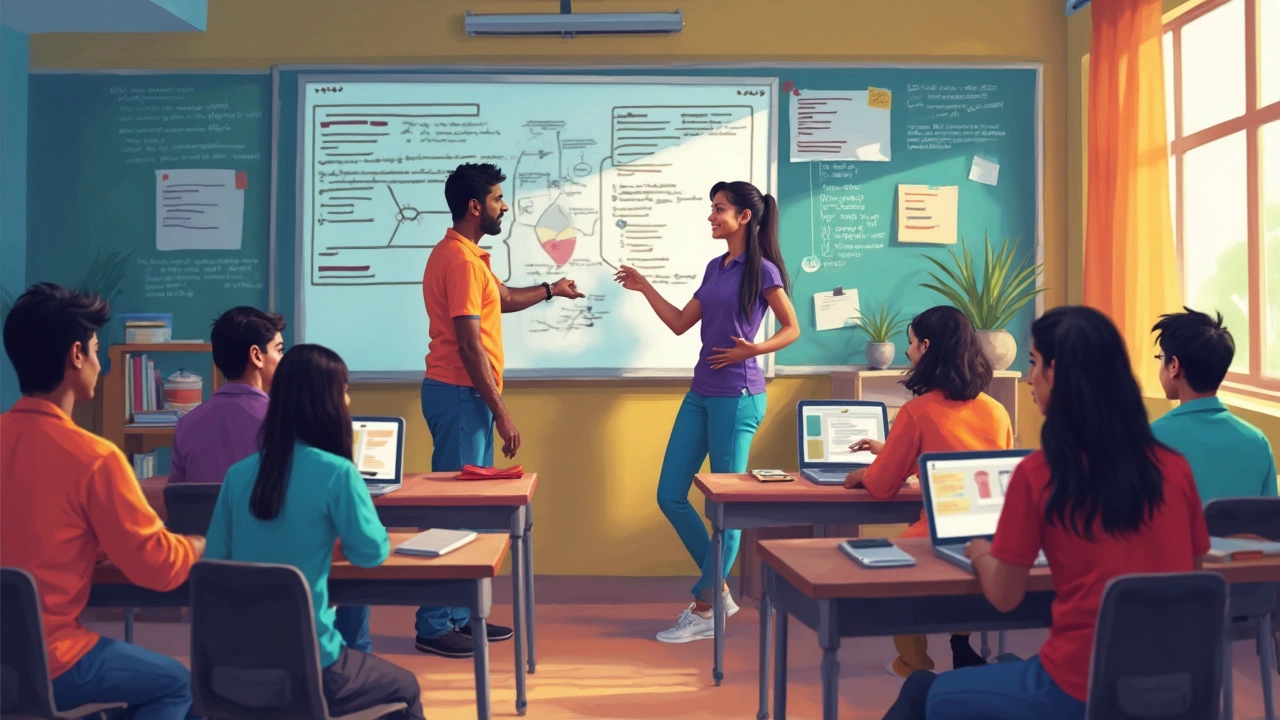Ever noticed how choosing a coding class feels like picking a streaming service? So many choices, all promising big things, but nobody wants to waste money or time on the wrong one. People often think all coding classes are the same, but honestly, they couldn't be more different. Want to build websites? You'll need a different class than someone aiming to write code for robots. And if you can't stand boring lectures, trust me, you don't want a course packed with hours of someone droning over slides.
Right away, the biggest mistake most people make: chasing the most famous or expensive course, assuming it's the best. Sometimes, a cheaper, local bootcamp or even a free online class nails the basics better than the big brands. The key is knowing what fits your learning style and goals. Want hands-on projects and real feedback? Not all classes offer that – and it's a game-changer if you're serious about using these skills at work or launching something on your own.
- Different Types of Coding Classes Explained
- Matching Your Goals with the Right Class
- What Makes a Coding Class Worth It?
- Tips for Getting the Most Out of Your Coding Course
Different Types of Coding Classes Explained
Let’s cut through the noise—there are a few main buckets that most coding classes fall into, each with its own vibe and pros and cons.
- Online Self-Paced Courses: These are platforms like Codecademy, freeCodeCamp, and Udemy. You jump in whenever you want, pick up new skills on your own schedule, and replay stuff whenever something doesn’t click the first time. It’s all about flexibility, but you need to stay motivated because no one’s chasing you for homework.
- Live Online Classes: Big names here include General Assembly, Le Wagon, and Skillcrush—think Zoom sessions, real-time feedback, and group projects. If you want guidance as you go and enjoy interaction, this can feel a lot like a classroom with a schedule and classmates.
- In-Person Bootcamps: These are super-intense, full-time (or sometimes part-time) experiences that take you from zero to job-ready in a few months. Bootcamps like Flatiron School and Ironhack are well-known. You work on real projects, team up with others, and often get career coaching. It’s a grind, but for folks looking to switch careers fast, it works.
- College Courses: Universities offer everything from intro to Python to hardcore computer science. If you want a deep academic understanding or aim for a tech degree, this route gives you that foundation. But it’s slower and usually pricier.
- Workshops & Meetup Groups: These are usually local, short events—anything from a Saturday crash course on web dev to a few weeks learning game design. Perfect for testing the waters or picking up a new tool without a huge commitment.
Here’s a quick comparison to help you weigh your options:
| Class Type | Typical Duration | Flexibility | Best For |
|---|---|---|---|
| Online Self-Paced | Varies (weeks to months) | High | Busy schedules, self-motivated learners |
| Live Online | 8-24 weeks | Medium | People who need structure and interaction |
| Bootcamps | 3-6 months | Low | Career changers, job seekers |
| College Courses | 4 months+ | Low | Degree seekers, academic types |
| Workshops/Meetups | Hours to weeks | High | Test runs, hobbyists, upskilling quickly |
The truth is, the best coding courses for you depend on what fits your life and goals. Mixing and matching a couple types can even work better—like starting with a free crash course and then doubling down with a more structured bootcamp.
Matching Your Goals with the Right Class
Here’s the thing: programming isn't one-size-fits-all. Your background, your ambitions, and even your free time play a giant role in picking the best coding courses for you. Are you after a total career switch into tech? Looking to launch an app? Or just want to automate some boring tasks at work? Each goal points you toward a different kind of coding class.
According to a 2023 Stack Overflow survey, over 60% of developers are self-taught or used online resources to get started. But if your dream is landing a job fast, traditional four-year degrees take much longer compared to most coding bootcamps, which usually last just 3-6 months.
“The best way to learn to code is to start building things that matter to you. Pick classes that make you code, not just watch.” — Angela Yu, Lead Instructor at App Brewery
Let’s break down common scenarios so you can see where your needs fit:
- Career change or job-focused: Go for immersive coding bootcamps like General Assembly, Flatiron, or Le Wagon. These usually include job interview prep, projects, and networking.
- Beginner dabbling: Free or cheap online platforms like Codecademy and freeCodeCamp are perfect for testing the waters before committing to more intense programs.
- Specialized tech (data science, robotics, AI): Look for coding classes with a clear focus – DataCamp for data science, Udacity for AI, or Coursera programs partnered with universities.
- Building for yourself: If you just want enough skills to automate spreadsheets or launch a website, targeted workshops (like WordPress or Excel VBA) are way faster and easier than a full stack bootcamp.
If you’re looking for something flexible, self-paced online courses are everywhere, but the live, cohort-based classes have better peer pressure and accountability, which a lot of folks need to stick with the learning curve.
| Goal | Recommended Coding Class Type | Typical Duration |
|---|---|---|
| Get a job | Bootcamp (General Assembly, Flatiron) | 3-6 months |
| Test the waters | Codecademy, freeCodeCamp | 1-8 weeks |
| Specialize | Udacity Nanodegree, DataCamp | 2-6 months |
| Build for yourself | Short online workshops | Hours to weeks |
The bottom line: always start by thinking about your actual end game. The best coding courses are the ones moving you directly toward that specific target, not just the shiniest option everybody’s talking about in ads.

What Makes a Coding Class Worth It?
There’s more to a coding class than just the price tag or who’s teaching it. You want real results, not just a shiny certificate. The best coding classes actually help you build something—websites, apps, games, or tools you can show off. If you walk away from a class with a bunch of finished projects in your portfolio, you know you’ve spent your time well.
Let’s talk about hands-on learning. Research from Course Report shows that students who complete at least three real-world projects are twice as likely to land a tech job. That’s why the top coding courses make sure you’re not just listening, but actually coding, troubleshooting, and getting your hands dirty. If you see project-based assignments on the syllabus, that’s a green flag.
Another thing: feedback. A class with real feedback from pros or mentors matters way more than a stack of multiple-choice quizzes. Think about this: Stack Overflow’s 2023 survey found that nearly 60% of new developers say mentorship was the fastest way they improved. If a coding class connects you with a real person for code reviews or Q&A, your learning goes next-level.
Watch out for these signs that a class is truly worth it:
- Up-to-date curriculum. Tech moves fast. If the course is still teaching you jQuery as the core of web development, it’s out of date. Look for recent topics like React, Python 3, or cloud basics.
- Real community. Lively forums, group projects, or Slack channels are more than social perks—they’re places to get unstuck fast and learn from others’ mistakes.
- Clear career help. Good coding bootcamps and even some online programming classes offer resume help, interview practice, or job guarantees. If you want a new job, that’s huge.
- Flexible formats. Got work or school? See if the class has recorded lessons, part-time tracks, or self-paced schedules. Flexibility keeps you from dropping out.
Here’s a quick peek at how real coding classes stack up—focusing on what really matters:
| Feature | Bootcamp (Full-Time) | Online Self-Paced | University Class |
|---|---|---|---|
| Projects | Yes, tons | Depends on platform | Sometimes (often theoretical) |
| Mentorship | Usually 1-on-1 | Sometimes/forum-based | Rare (except office hours) |
| Flexible Schedule | No (set times) | Yes | No (semester-based) |
| Career Support | Strong focus | Some (varies) | Very rare |
Bottom line: if your coding classes give you real projects, updated content, clear feedback, and some human connection, they’re worth your cash—no matter if they’re online or in person.
Tips for Getting the Most Out of Your Coding Course
Ready to squeeze everything you can from your coding classes? Too many folks sign up, then coast along only half-paying attention. Let’s avoid that trap and actually build the skills you signed up for.
- Don’t just watch—get your hands dirty. You’ll pick up actual coding muscle by typing out code yourself, fixing bugs, and breaking stuff. You remember more if you debug it yourself versus just copying from the screen.
- Ask for help early. Most courses have forums, group chats, or office hours. Don’t wait till you’re totally stuck—jump in and ask questions. A Stack Overflow survey found that people who seek help right away solve their problems faster and get less frustrated.
- Build tiny real projects as you go. Don’t wait for the final project. Try making a mini calculator or a basic website after every module. Small wins add up and keep you motivated way more than endless lectures.
- Review your code after each lesson. Go back and see what you actually understood. If it feels sketchy, pause and practice that bit before moving on. Future-you will thank you.
- Use free resources to boost what you learn in paid classes. Sites like freeCodeCamp or MDN Web Docs have killer articles and exercises—sometimes they’ll explain it better than your main class.
Wondering what really moves the needle? Here’s a quick look at what students from an online coding bootcamp reported helped them the most:
| Study Habit | % Who Found It Useful |
|---|---|
| Doing Mini-Projects | 78% |
| Joining Study Groups | 65% |
| Asking Questions Early | 82% |
| Watching Lecture Recordings Again | 54% |
No need to do everything perfectly; just pick the habits that actually help you work through confusion and keep going. Most people drop out not from lack of brains, but because they try to memorize instead of actually coding. Stick with it, experiment, and you’ll get more out of your best coding courses than you thought.
